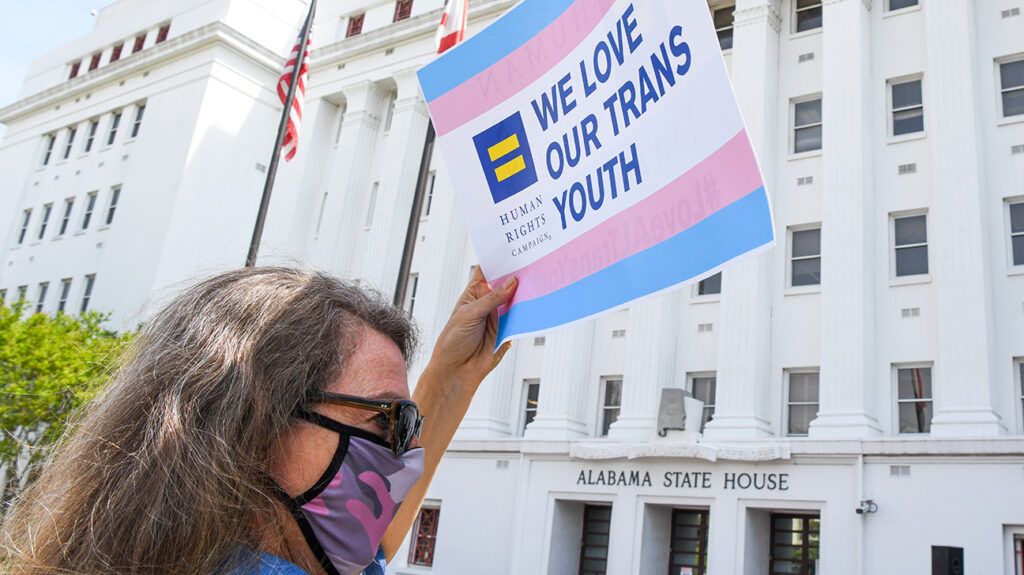
- A new Alabama law says it’s a felony to provide gender-affirming medical care to transgender or gender nonconforming minors, punishable by up to 10 years in prison.
- The law is the latest in a wave of anti-trans legislation affecting transgender communities.
- But gender-affirming care can be lifesaving for trans youth, reducing their chances of developing depression and suicidality.
- On May 13, a federal judge issued a preliminary injunction to block part of the law — but the fight for trans rights is far from over.
On May 8, an Alabama law affecting transgender minors went into effect, making it a felony to provide transition-related medical treatment to transgender and gender nonconforming minors.
After sweeping through the House on April 8, Gov. Kay Ivey signed the Alabama Senate Bill 184 (SB 184) into law.
Alabama is the third state in the country — along with Arkansas and Texas — to block or restrict gender-affirming medical care to minors and the first state to officially make it a crime punishable by up to 10 years in prison.
On May 13, U.S. District Judge Liles Burke issued a preliminary injunction to block part of the new Alabama law. The injunction would block the Vulnerable Child Compassion and Protection Act from making it a felony to prescribe puberty blockers and hormones to transgender minors. The judge upheld the ban on gender-affirming surgery, which doctors say isn’t provided to minors.
Despite medical experts recommending gender-affirming medication for trans minors, conservative lawmakers continue to rail against science, often in the name of personal or religious beliefs.
“The psychological damage and trauma to children, parents, and families as a result of these bans will be severe and last for generations,” said Bethany Cook, PsyD, a child psychologist and member of the LGBTQ community in Chicago.
SB 184 bans puberty blockers, hormones, and gender-affirming medical procedures for trans youth under age 19, which can be lifesaving for transgender people.
“When a child’s lived experience isn’t validated by their parents [or] caregivers, or they’re taught by society that what they feel is something to be ashamed of, it negatively impacts their mental health,” Cook said.
According to Cook, the mental health effects of laws that target transgender minors may include:
- low self-esteem
- depression
- anxiety
- post-traumatic stress disorder (PTSD)
- internalized transphobia
- self-harm
- suicidal ideation and attempt
- substance misuse
The Trevor Project, a research organization for LGBTQ+ suicide prevention, recently condemned multiple anti-transgender bills signed into law by the Alabama governor, including SB 184.
“At the eleventh hour, the governor of Alabama signed into law a slate of arguably the most extreme anti-trans bills we have ever seen,” Sam Ames, director of advocacy and government affairs for The Trevor Project, said in a statement.
“These policies attempt to make providing gender-affirming care a felony and cut off access to nearly every support system transgender, and nonbinary youth have — support systems we know are critical for reducing their suicide risk and for advancing their positive mental health,” they said.
Cadyn Cathers, PsyD, a transgender man and psychologist specialist in trans mental health, told Psych Central that negative headlines about the transgender community are compounded by anti-trans bills like SB 184.
“Transgender and nonbinary people are receiving negative headlines all the time — another murder, another person rejected by their family, another person denied basic human rights,” Cathers said.
“The new wave of anti-trans bills is another form of this,” he added. “These bills do a lot of damage — it sends the message that people have permission to discriminate and that we, as trans people, are second-class citizens. It teaches trans people they are not worthy of love, belonging, medical care, work, and other human needs.”
Research from 2022 in the Journal of Adolescent Health shows that gender-affirming hormone therapy lowered the risk of depression and suicidality for the 12,000 transgender and nonbinary youth ages 13 to 24 who were surveyed.
Other research has shown similar positive results.
Medical experts and organizations — such as the
Gender-affirming care is offered at an age-appropriate level under the supervision and guidance of a medical professional.
Hormone therapies such as puberty blockers aren’t offered to younger trans children until the first signs of puberty appear. And in most cases, gender-affirming surgeries aren’t offered to people under the age of 18.
And according to a recent poll by the Trevor Project, the majority of adults think that transgender minors should have access to gender-affirming hormone therapy (55%) and puberty blockers (52%) if the treatments are recommended by doctors and supported by parents.
As the transgender communities and allies in Alabama and beyond express outrage, the federal judge who blocked part of the law may offer a glimmer of hope.
If the injunction is successful, it will mark a moment of progress for the trans community amidst a seemingly endless barrage of negative headlines. But the fight for trans rights is far from over, regardless of the outcome.
“They will not succeed,” Ames said. “To trans and nonbinary youth in Alabama and across the country: This is not over. We will fight as far as it takes until the day every young person knows they are loved, supported, and worthy just as they are. We’re here with you today, we’re here for you every day, and we’re not going anywhere.”
